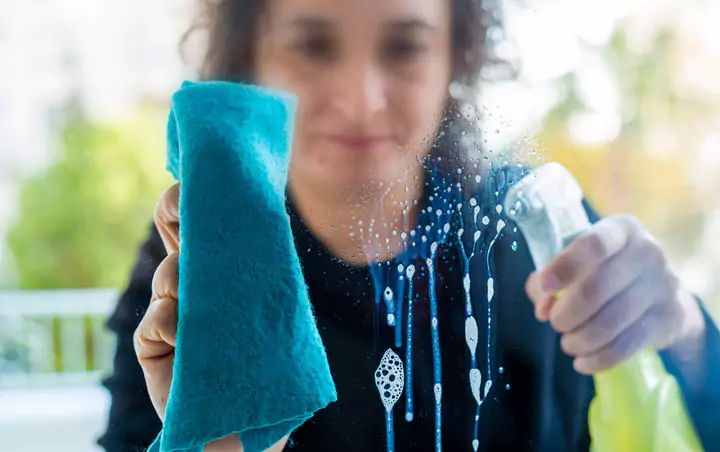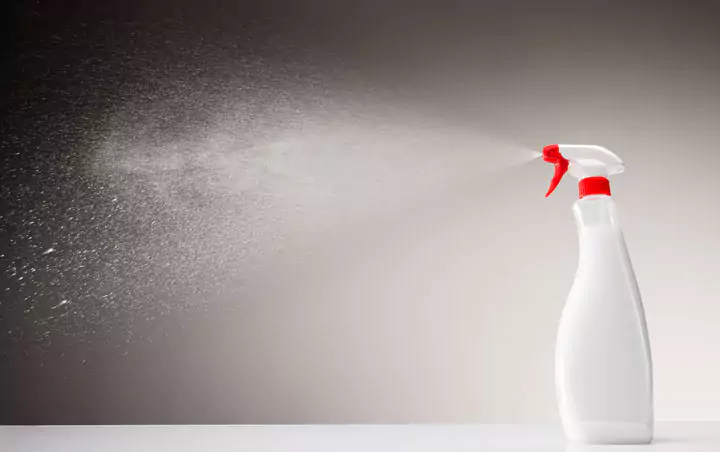Scientific Study on Household Cleaning Products and Women’s Lung Health Explained

A new, independent study based on 20 years of research reveals a sobering fact: Cleaning your home with national brand cleaners significantly damages lung tissue. Almost all the cleaning products that you buy at the grocery store are made with a multitude of harmful chemicals. According to the study, some of the likely culprits are ammonia, chlorine bleach, and quaternary disinfectant compounds. The study also showed that cleaning with products that contain dangerous chemicals as little as once per week was as damaging over time to respiratory health as smoking a pack of cigarettes a day for 20 years! 1
About the Study
Starting in the 1990s, the Community Respiratory Health Survey began tracking a large population of 6,235 women and men with a beginning average age of 34 at 22 health centers in multiple countries. Over the next 20 years, participants were quizzed about their use of both spray and liquid home cleaning products and had their lung capacity tested regularly. Lung capacity was measured by breathing into a spirometer, an instrument that measures how much air you can exhale. Those with compromised lung function are not able to exhale as much volume as someone who is healthy.
Fifty-three percent of the participants were women and 44% were lifelong non-smokers. Analysis was adjusted for smokers and those with doctor-diagnosed asthma. Participant data was extensive, ensuring that each subject was well characterized, significantly reducing the likelihood of misrepresentation.
Once twenty years of data had been collected, the results were compiled and analyzed by a top team of 28 international researchers from nine countries, led by scientists at The University of Bergen in Norway. The study, titled Cleaning at Home and at Work in Relation to Lung Function Decline and Airway Obstruction, was recently published in the American Thoracic Society’s American Journal of Respiratory and Critical Care Medicine.
The results confirm what Melaleuca has known for years: toxic chemical ingredients in national brand home cleaning products take a toll on the health of those who clean with them. The extent of the devastation is only now beginning to be uncovered.
Finding 1: Using national brand cleaners as little as once per week is as damaging to lung health as smoking 20 cigarettes per day.
By now, just about everyone knows the dangers of smoking cigarettes. Among their many hazards include depleted lung capacity—the result of damage to the tender internal tissues of the respiratory system. Lung capacity is important because it is a marker of overall health and fitness. The body depends on the lungs’ life-giving ability to oxygenate blood and expel carbon dioxide—the waste product of metabolism.
Decreased lung capacity can lead to obvious declines in fitness, but since the body is so dependent on oxygen exchange, whole systems of the body can be compromised when the lungs become even partially debilitated.
Shockingly, the study concluded that women who used home cleaning products at least once per week saw the same reduction in lung capacity as those who smoked a pack a day over the same period. According to the authors, “Women cleaning at home or working as occupational cleaners had accelerated decline in lung function, suggesting that exposures related to cleaning activities may constitute a risk to long-term respiratory health.”
Finding 2: Women are affected far more than men.
Though there was a clear correlation between women who cleaned and respiratory illness, there was less correlation for men. While the scientists pointed out that the total number of men regularly using household cleaning products was significantly lower than women, the study summary also points out previous research that elaborates the increased sensitivity in the female respiratory system.
This finding is particularly concerning when considering that the most sensitive members of the population are also those engaging with these products with the most frequency.
Finding 3: Cleaning at home is just as, if not more harmful, than being an occupational cleaner.
The study survey categorized participants as “not cleaning,” “cleaning at home,” and “occupational cleaning.” While the “not cleaning” subset of women saw only expected, age-related change in lung capacity, the “cleaning at home” group saw the same decreases in lung health as “occupational cleaning.” How could this be the case when cleaning professionals are using cleaning products on a daily, ongoing basis, versus someone performing chores less frequently in their own home?
First, consider that occupational cleaners are most often required to use protective gloves, clothing, and even masks while performing their duties. Those at home casually disregard warning labels and use cleaning products without adequate protection. Additionally, professional cleaners move from room to room, working in larger spaces with better ventilation than someone at home. In fact, using cleaning products within the relaxed, comfortable confines of home may actually lend to a general complacency that ultimately leads to impaired health.
Finding 4: Liquid cleaners are just as dangerous as sprays.
Study researchers originally suspected that products delivered through a spray or mist would prove more dangerous than those applied as a liquid, gel, or wipe. Surprisingly, the study found no significant difference between cleaner delivery types. The implication is that the chemicals in liquid cleaners become just as available for inhalation through evaporation as those used in sprays.

Finding 5: Dangerous chemical ingredients including ammonia, chlorine bleach, and quaternary disinfecting compounds appear to be primary culprits.
In their conclusions, the researchers stated, “one could hypothesize that long-term exposure to airway irritants such as ammonia and bleach used when cleaning at home could cause fibrotic or other interstitial changes in the lung tissue, thereby leading to accelerated decline of FVC (forced vital capacity).”
Finding 6: Women who regularly use cleaning products have increased rates of asthma.
Researchers found increased rates of asthma within the groups who used national brand cleaning products regularly. This echoes multiple recent studies that have clearly linked the use of dangerous chemical cleaning agents with the onset of asthma.
Finding 7: Damage is cumulative over time.
When toxic chemicals–like those found in most all national brand cleaning products–are regularly inhaled into the sensitive tissues within the lungs, it makes sense that respiratory problems would result. “Exposure to cleaning chemicals,” the researchers wrote, “could result in accelerated lung function decline and chronic airway obstruction; low-grade inflammation over many years could possibly lead to persistent damage to the airways.”
Simply stated, regular exposure to the toxins within the home never allow the respiratory system an opportunity to heal, creating a condition where internal damage accumulates. Dr. Cecile Svanes, a professor at the University of Bergen and senior author of the study said, “We feared that such chemicals, by steadily causing a little damage to the airways day after day, year after year, might accelerate the rate of lung function decline that occurs with age.”
What the Study Means for You
For most women who try to keep a clean, safe home, the results of the study are an imperative call to action.
If you haven’t done so already, now is the time to rid your home of the dangerous national cleaning products that contain so many harmful chemicals! What kinds of cleaners are to blame? Most all home cleaning products including disinfectants, kitchen cleaners, bathroom cleaners, toilet cleaners, shower and tub cleaners, scrubs, stain removers, floor cleaners, degreasers, window and glass cleaners, and surface cleaners.
Though the research results have gained some immediate public interest online and in the general news media, it is up to you to not only take care of your own home, but to warn friends, family, and neighbors of the very real consequences of using these conventional home cleaning products.
Only Melaleuca Offers a Solution
For more than three decades, Melaleuca scientists have formulated cleaning products that perform household chores with unparalleled results—without the cheap, widely available, dangerous chemicals national brands are known to contain. Our EcoSense® line has taken a firm stance on ingredients like ammonia, quaternary disinfectants, chlorine bleach, and other dangerous chemicals. We don’t use them! We never have and never will!
Instead, we use safer, biodegradable solutions that are found in nature, like plant-derived ingredients. We use thyme oil, surfactants from coconut and palm oil, natural enzymes, the same citric acid found in lemons, and 100% pure Melaleuca oil. This is why EcoSense cleaning products are so safe that no childproof caps are required. And it’s why you can clean your home with confidence—instead of holding your breath.
What’s more, EcoSense products are proven to perform. They clean as well or better than the competitive products that use dangerous ingredients. They provide a clean that is far greater than water alone could ever provide. And their advanced formulas clean better than other supposed “green” products by measurable margins. There is a reason Melaleuca has been the leader in safer-for-your-home cleaners for more than a generation.

Better Health Starts at Home
Melaleuca is committed to providing the products our customers need for the ultimate in healthy living. We are the Wellness Company. From supplements to foods to home cleaning products, the products you bring into your home do make a difference.
We are pleased to see the scientific community draw unequivocal conclusions about topics we have been aware of for years. We are confident that as the facts about our competitors’ products become more widely known, more consumers than ever will seek out the products that only Melaleuca can provide.
Full Study: Cleaning at home and at work in relation to lung function decline and airway obstruction
1. Am J Respir Crit Care Med. 2018 Feb 16. doi: 10.1164/rccm.201706-1311OC.

how can i buy melaluca products?
This is just an awesome article
I love using tub and tile so with mela magic. The products are amazing!
I Love the products, have been using them since early nineties
Grew up on melaleuca oil. All of there products are amazing!
Let me know if you are still interested
Join Melaleuca and enjoy using all the healthy products for you, your family & your home.
Healthy safe products.
I would be able to help you!
Hi Liz,
I can help you learn more about Melaleuca and how to become a member. Send me an email and I will gladly send you the details.
Jenn
Long time user of Tough-N-Tender since 1989! Don’t ever change the formula!
Cleaning with Sol-U-Gard has kept our family free from flu virus and other germs promoting healthy living. I recommend it to all of my friends especially if you are ill in order to prevent the germs from spreading to their family members!
I love all their products. I am healthier at 61 than at 40. Thank you Melaleuca!
I’ve been a Shopper and Business Rep for over 2 years… still trying ALL their products …and the ones I’ve tried I will keep buying & referring. I WISH, I knew about Melaleuca in 1985 … I am truly Grateful for this Company~
Honestly, go to the person who posted this article on their facebook page. They should be able to help you learn about how to shop at Melaleuca.
Having taken Advair twice a day for years, I now do not have to….I clean with Melaleuca products, I now do not have to take Advair…..my asthma is under control, I am so grateful….thank you Melaleuca ??
In 1979 I started cleaning carpets to provide for my family 12 years later I had 23 employees and thought I was living the American dream. Ammonia and quaternary disinfectants we’re used daily by myself and all my employees. Two doctors in 1993 told me I would pack oxygen the rest of my life and to expect to live 10 years. They said it looked like I had smoked four packs of cigarettes a day for 40 years. I have never smoked. Four of my employees have had cancer 1 died Today my house hold is all about Melaleuca and I have got most of my lungs back thank you Melaleuca
How dangerous is Green Thumb wasp and hornet foam spray when the person inside the building is not next to the person using it outside a partially open window? No spray was felt but I imagine there were unseen particles in the air we breathed inside the building.
great article. kudos and love love love Melaleuca